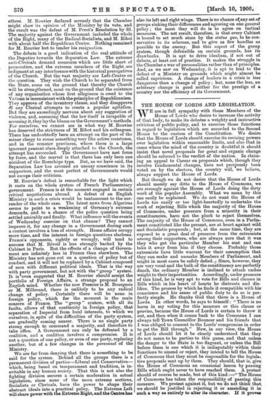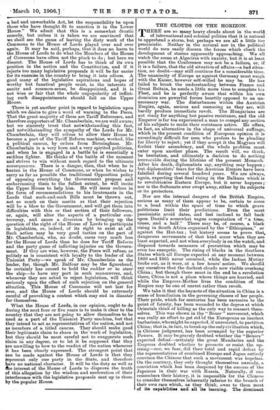THE HOUSE OF LORDS AND LEGISLATION.
WE are in full sympathy with those Members of the House of Lords who desire to increase the activity, of that body, to make its debates a weighty and instructive criticism of public policy, and to exercise those functions in regard to legislation which are accorded to the Second House by the custom of the Constitution. We desire that the House of Lords should exercise its revising powers over legislation within reasonable limits, and also that in cases where the mind of the country is doubtful it should insist that novel proposals for great and organic change should be referred to the verdict of the nation. In claim- ing an appeal to Caesar on proposals which, though they involve fundamental changes, have not previously been voted on by the electors, the country will, we believe, always support the House of Lords.
But though we do not desire that the House of Lords should merely say ditto to the House of Commons, we are strongly against the House of Lords doing the dirty work of the popular Assembly. What we mean by this can easily be explained. We do not want the House of Lords too easily or too light-heartedly to undertake the work of rejecting Bills which the majority of the Hells° of Commons, under pressure from a minority in their constituencies, have not the pluck to reject themselves. The majority of the House a Commons, even in a Parlia- ment constituted like the present, are at heart against wild. and Socialistic proposals ; but, at the same time, they are exposed to a great deal of pressure from the extremists among their supporters, who are always sure that it was they who got the particular Member his seat and. can take it away from him if they choose. Probably those extremists have little warrant for their assumption that they can make and unmake Members of Parliament, and. might in most cases be safely defied. .j, Since, however, they are very vocal and the bulk of the constituency are perfectly dumb, the ordinary Member is inclined to attach undue weight to their importunities. Accordingly, under pressure of this kind, he is very apt to vote for Bills and clauses in Bills which in his heart of hearts he distrusts and dis- likes. The process by which he finds it compatible with his conscience and his sense of public duty to do so is per- fectly simple. He thanks God that there is a House of Lords. In other words, he says to himself : "There. is no harm in my voting for this measure or this clause or proviso, because the House of Lords is certain to throw it out, and then when it comes back to the Commons I can always tell Town Councillor Bouncer and. his friends that I was obliged. to consent to the Lords' compromise in order to get 'the Bill through." Now, in our view, the House of Lords should let it be clearly understood that they do not mean to be parties to this game, and. that unless the danger to the State is too flagrant, or unless the Bill before them is one which it is indisputably within their functions to amend or reject, they intend to tell the House of Commons that they must be responsible for the legisla-. tive proposals sent up by them. They should, that is, give the House of Commons an occasional lesson by passing Bills which ought never to have reached them. A protest should of course be made, but of this kind. The House of commons has taken the responsibility of passing this measure: justified against it, but we do not think that be , we should ustified in rejecting it Or amending it in such a way as entirely to alter its character. If it proves a bad and. unworkable Act, let the responsibility be upon those who have thought fit to sanction it in the Lower House." We admit that this is a somewhat drastic remedy, but unless it is taken we are convinced that we shall see the game of leaving the dirty work of the Commons to the House of Lords played over and over again. It may be said, perhaps, that it does no harm to the House of Lords to do what the Members of the House of Commons have often not the pluck to do ; but here we dissent. The House of Lords has to think of its own position in the nation and the Constitution, and if it rejects too many legislative proposals it will be far easier for its enemies in the country to bring it into odium. A good many of the legislative aspirations and hopes of worthy but fanatical people must, in the interests of sanity and. common-sense, be disappointed, and it is not wise or fair that the whole unpopularity of inflict- ing such disappointments should fall on the Upper House.
There is yet another point in regard to legislation upon which we desire to give a word of warning to the Peers. That the great majority of them are Tariff Reformers, and therefore supporters of Mr. Chamberlain, we are well aware; but we sincerely trust that notwithstanding this fact, and notwithstanding the sympathy of the Lords for Mr. Chamberlain, they will refuse to allow their House to become a part of the Tariff Reform machine, worked, like a political caucus, by orders from Birmingham. Mr. Chamberlain is a very keen and a very spirited politician, and when he is engaged in a battle he is essentially a reckless fighter. He thinks of the battle of the moment and strives to win without much regard to the ultimate consequences. There is a danger, then, that when he is beaten in the House of Commons, or when he wishes to carry as far as possible the traditional Opposition policy of opposing everything the Government propose and embarrassing them to the fullest extent, he will incite the Upper House to help him. He will issue orders in the form of recommendations to his lieutenants in the Lords that such-and-such Bills must be thrown out, not so much on their merits as that their rejection will be a blow to the Government, and will get them into difficulties with this or that section of their followers, or, again, will alter, the aspects of a particular con- troversy, and. cause a diversion by bringing up the question of the right of the House of Lords to participate an legislation, or, indeed, of its right to exist at all.•Such action may be very good tactics on the part of Mr. Chamberlain, who, no doubt, cares very much less for the House of Lords than he does for Tariff Reform and the party game of inflicting injuries on the Govern- ment. If they are wise, however, the Peers will refuse, as politely as is consistent with loyalty to the leader of the Unionist Party—we speak of Mr. Chamberlain as the leader, for, though Mr. Balfour may be the figurehead, he certainly has ceased to hold the rudder or to steer the ship—to have any part in such manceuvres, and, whenever they are asked to reject legislation, will think seriously upon the effect of such rejection on the general situation. This House of Commons will not last for ever, and the House of Lords should be extremely careful of provoking a contest which may end in disaster for themselves.
What the House of Lords, in our opinion, ought to do during the next four or five years is to make it clear to the country that they are not going to allow themselves to be Alma as a part of the Unionist party machine, but that they intend to act as representatives of the nation, and not its members of a titled caucus. They should make good their legitimate claim to share in the 'work of legislation, but they should be most careful not to exaggerate such Claim in any degree, or to let it be supposed that they ltre unwilling to bow to the verdict of the nation whenever it has been clearly expressed. The strongest point that Can be made against the House of Lords is that they *epresent only one party in the State, and therefore have no national character. It will be the duty as well as 420 interest of the House of Lords to disprove the truth of this allegation by the wisdom and moderation of their interference with the legislative proposals sent up to them by the popular House.











































 Previous page
Previous page